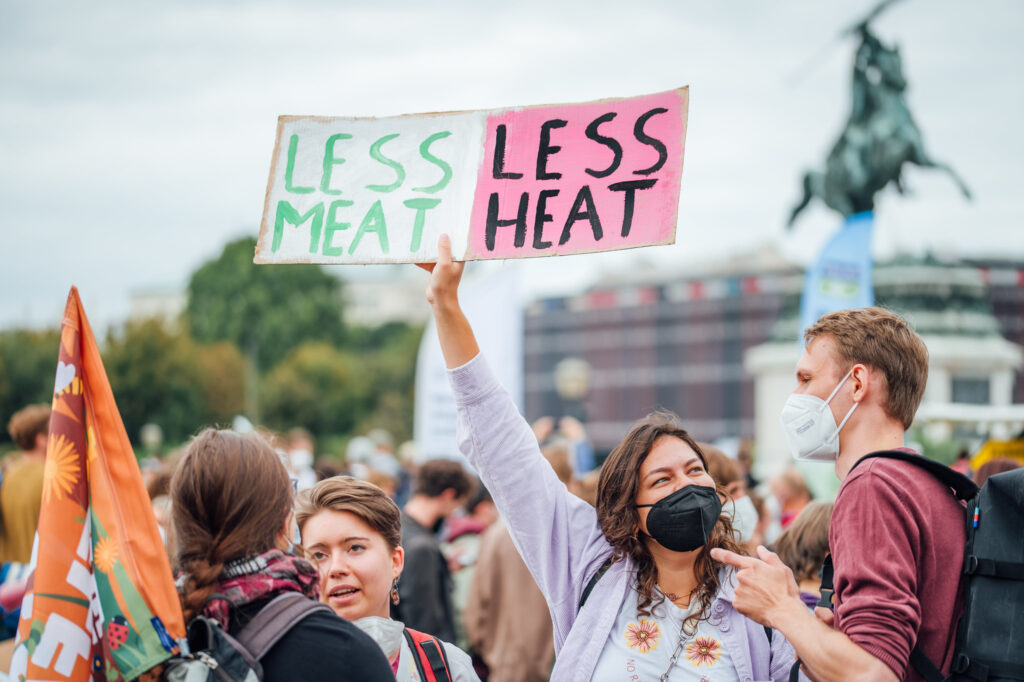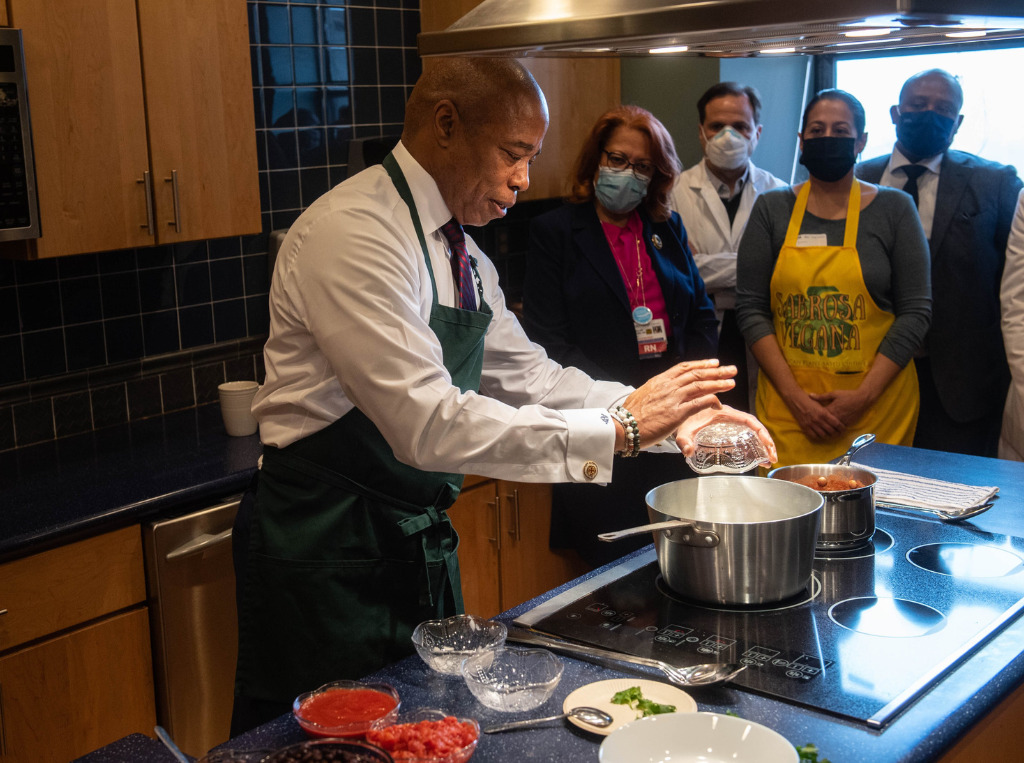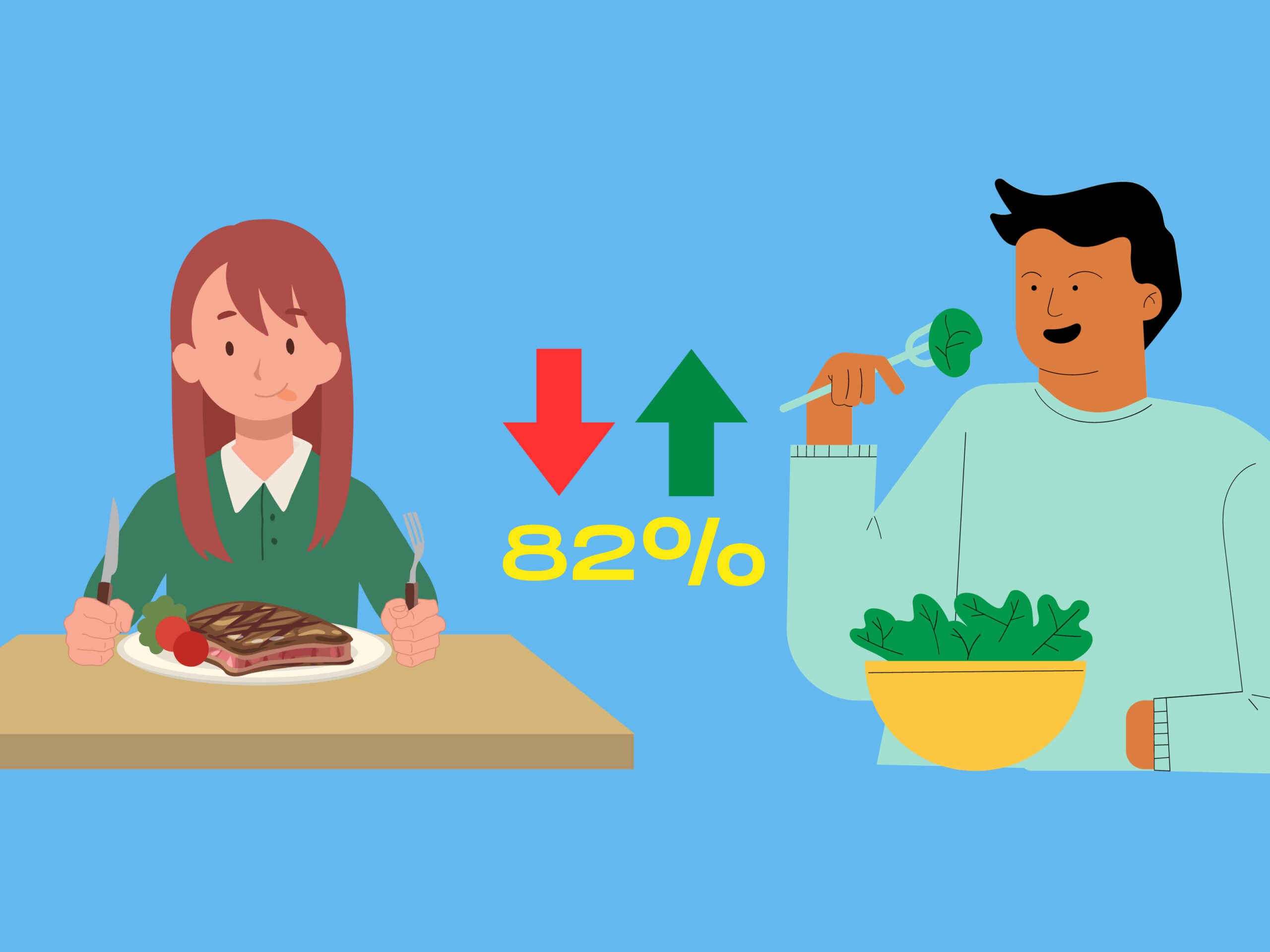To Avoid Climate Disasters Like the NYC Floods, the US Must Reduce Its Meat Consumption by 82%
6 Mins Read
New York City is in a state of emergency, with flash floods leaving the Big Apple struggling to recover, merely three months after the city was engulfed in a polluted haze due to Canadian wildfires. Experts have blamed it on the climate crisis, and warned that it is a “new normal”. To prevent that from becoming a reality nationwide, it’s imperative that the US recognise the link between animal agriculture and climate change – and a new study says this means Americans need to cut their meat intake by 82%.
It was only two years ago when Hurricane Ida and its accompanying record-breaking rainfall killed 13 people in the US’s largest city. That intensive rainfall has poured down again and caused flash floods and emergencies in New York just two years later, is a sign of things to come. Just listen to New York governor Kathy Hochul, who told Reuters: “This is unfortunately what we have to expect as the new normal.”
The city’s environmental protection commissioner Rohit Aggarwala told the New York Times: “This changing weather pattern is the result of climate change, and the sad reality is our climate is changing faster than our infrastructure can respond.”
These are grave statements. Leaders are informing US citizens that flash flooding and hurricanes will be their new reality. While Aggarwala cites a lack of infrastructure preparedness to combat the consequences of climate-related extreme weather events, there’s another key issue he and other officials often omit when discussing what needs to change: meat consumption.
Americans eat too much meat

The problem – and this should not be news – is that we eat too much meat. Americans alone consume 233.3g of meat a day, which is almost three times the maximum amount recommended by the Eat-Lancet Commission to achieve the UN’s Sustainable Development Goals and meet the targets of the 2015 Paris Agreement.
Equally striking is the fact that just 12% of Americans are responsible for half of the country’s meat consumption, according to a recent study. Additionally, a 2021 poll found that 59% of US citizens believe eating meat is just part of “the American way of life”. If that really is the case, these Americans might need to start making some shifts.
New research by Compassion in World Farming, an animal advocacy organisation says Americans need to cut their meat intake by 82%, if they’re to avoid similar climate disasters in the long term.
According to the group’s US director, Ben Williamson, “National governments and other policy-setting institutions ignore the overwhelming evidence that meat consumption is a primary driver of the climate crisis and significantly impacts our ability to limit the planet’s warming to sustainable levels,” he writes for The Hill. “Without a dramatic reduction in US meat consumption, we will be unable to avert a climate catastrophe.”
Williamson goes as far as to say that our meat-heavy diets are driving us towards extinction. “Not only is it responsible in large part for extreme weather events, it is also a significant contributor to water scarcity and biodiversity loss. Reducing meat consumption would not only help to alleviate these burdens but also allow us to redirect precious resources toward more sustainable agricultural practices and forest preservation.”
Eating meat is bad for the climate

Research has constantly pointed to the enormous impact animal agriculture has on the environment. One study revealed that meat accounts for nearly 60% of all emissions from food, while livestock farming itself produces between 11-19.5% of the planet’s overall emissions. Moreover, animal-derived foods like meat and dairy cause twice as many emissions as plant-based foods and vegan diets can cut emissions, water pollution and land use by 75% compared to meat-rich diets.
Last month, a study revealed the demand for meat continues to rise – globally it’s expected that we will eat 14% more meat by 2030 – and this will lead to a 4% increase in agricultural land. But replacing half of our meat and milk intake with vegan alternatives by 2050 would instead shrink this area by 12%. It will also reduce agricultural and land-use emissions by 31%. The findings echo a similar study showing that we can avoid 100 gigatons of emissions if three-quarters of people adopt plant-rich diets by 2050.
Despite all this evidence, the detriments of meat-eating don’t seem to hit home for Americans. A Newsweek poll has shown that 40% of Americans don’t believe consuming less red meat would help lower emissions. And in August, a poll by the Washington Post and the University of Maryland found that 74% of Americans don’t think eating less meat would have any impact on climate change. And a survey by Gallup has revealed that the number of vegans in the US has reached a 10-year-low.
This isn’t helped by the fact that 93% of all media coverage about climate change doesn’t mention animal agriculture. Or that US politicians who are hoping to be president actively reject their own country’s science and call the climate crisis a hoax.
Just like the world, America needs a transition away from meat, and it needs it now. “It may seem impossible, but it’s not,” suggests Williamson. He explains that while individual diets are a way to achieve the consumption reduction goal, “governments and institutions have their roles to play, too”.
Policy recommendations to slash meat consumption

Compassion in World Farming’s report offers multiple policy recommendations. A change in research funding is one. Research has found that livestock farming receives 800 times more funding than plant-based and cultivated meat in the US, while 95% of all research and innovation spending between 2014-20 went to animal farmers, aimed at improving production.
The report calls for these subsidies to be redirected towards “plant-based innovation”, and urges more “public investment in research and innovation for cell-cultivated meat, plant-based proteins, and protein from fermentation”. It also suggests a meat tax, noting that “altering price instruments to incentivise a move away from industrial production and consumption of animal-sourced foods toward regenerative farming and less animal-dependent diets can help raise public revenue”. This, in turn, will drive the prices of plant-based diets down.
It further suggests a change in the Dietary Guidelines for Americans to recommend a lower amount of red and processed meat consumption. Additionally, cooperation across policy areas and stakeholders – as well as industry collaboration – is “necessary to enable dietary change”, and meat reduction needs to be built into companies’ sustainability goals.
And perhaps fittingly, Williamson cites the example of the flood-hit New York City, which has a Good Food Purchasing programme to encourage institutions to buy food based on five values: local economies, environmental sustainability, valued workforce, animal welfare, and nutrition. The city, whose mayor Eric Adams is a passionate advocate of plant-based diets, has committed to lowering its food-related emissions by a third by 2030.
Perhaps the rest of the US can follow the city’s lead. There’s already precedent here: earlier this year, 1,400 US mayors ratified a resolution promoting a shift to plant-based diets across the country, arguing that this could address chronic diseases, climate change and national healthcare costs.
With a national election coming along – and many presidential candidates still ignoring the realities of climate change, even as their country burns and drowns – such initiatives are more important than ever.




